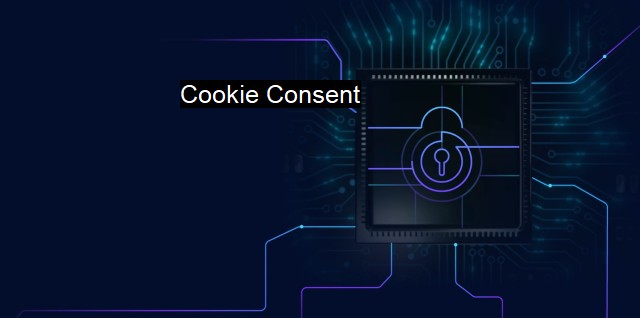What is Cookie Consent?
Understanding the Importance of Cookie Consent and Its Role in Safeguarding Privacy on the Internet in the World of Cybersecurity and Antivirus Software: An Overview of Regulations, Laws, and Best Practices
Cookie consent is a term used to describe a requirement specified under certain privacy laws, like the European Union's General Data Protection Regulation (GDPR) and the California Consumer Privacy Act (CCPA), that websites must inform visitors about the data they gather through cookies and obtain their explicit consent before collecting such info.Cookies are small text files stored on individuals' devices by websites to make the internet experience more personal and efficient. They typically collect a variety of information, such as items placed in shopping carts, preferences, and browsing histories. Still, they can also record an individual's personal information such as name, address, or even credit card data.
While cookies are instrumental in customising the internet experience, their ability to track and record behaviors raises cybersecurity issues. This is because unapproved or unlawfully exploited cookies can lead to personal data leaks, identity theft, or other harmful online threats, which makes them an attractive target for hackers.
To protect users from these threats, laws such as the GDPR and CCPA came into effect, mandating relevant cybersecurity measures. One of these is the cookie consent that obliges websites to confirm users' consent before utilizing cookies.
Websites must clearly communicate what data they collect, how they plan to use it, with whom they might share it, and how long they will keep it before users can consent or reject the use of cookies. Websites often manifest this communication in the form of cookie banners or pop-ups that appear when a user first accesses a website.
With such measures, the aim is to enhance users' rights to their data and to ensure they have an active role in deciding how their data is used. Antivirus and cybersecurity software play a significant role within this context. By protecting digital devices from threats like malware and spyware, this type of software can add an extra protective layer and help consumers feel safe from any cookie-related threats.
It is important to note that solely depending on antivirus software can be mistaken because cookies do not act as traditional viruses. Their basic purpose is to enhance the user experience, not to damage or disrupt. Therefore, they usually cannot be detected by antiviruses. Hence, enabling cookie consent provides a fundamental cornerstone in today's cybersecurity framework.
Apart from the apparent privacy issues, obtaining cookie consent can affect a website's functionality, performance, and its ability to provide personalized experiences. the preservation of online privacy and safety outweighs any potential inconvenience encountered.
Today, cookie consent has grown into a ubiquitous part of internet browsing. Many users may regard cookie notices as a nuisance yet understanding the cybersecurity context behind the practice may shift those perspectives. The cookie consent is in place to empower users to grasp, control, and protect personal data in a world where cyber threats are increasingly sophisticated and bountiful.
Cookie consent embodies a significant aspect of a broader attempt to balance individual privacy rights with technological development. It enshrines a critical principle in the internet age - users should always have full understanding and control of their data and how it is exploited by others. Moving forward, the correct implementation of such laws, and continued user education on cybersecurity and antivirus protection will be crucial as data privacy issues remain at the forefront of digital transformation. So, in the cybersecurity context, only when cookie consent, legal requirements, and appropriate antivirus measures are adequately combined, true cybersecurity could be expected.

Cookie Consent FAQs
What is cookie consent?
Cookie consent is the acknowledgement or permission given by a website user to allow cookies to be stored on their device. It is a legal requirement under various data protection regulations to inform users about cookies and obtain their consent before they are stored on their device.Why is cookie consent important for cybersecurity?
Cookie consent is important for cybersecurity because cookies can potentially store sensitive user data such as login credentials and personal information. Without user consent, such data could be stored without their knowledge, increasing the risk of data breaches or cyber attacks. Cookie consent ensures that users have control over their data and can make informed decisions about how it is stored and used.What happens if a website does not obtain cookie consent?
If a website does not obtain cookie consent, it could face legal consequences such as fines or legal action for violating data protection regulations. Additionally, users could lose trust in the website and avoid using it in the future, leading to a loss in business or revenue.How can a website obtain cookie consent from users?
A website can obtain cookie consent from users through various methods such as pop-up banners, cookie banners or notices, and checkboxes on registration or login forms. The consent request should be clear and concise, providing detailed information about the types of cookies being used and how they will be used. Users should be given the option to opt-in or opt-out of cookie storage and the website should honor their preferences.| | A | | | B | | | C | | | D | | | E | | | F | | | G | | | H | | | I | | | J | | | K | | | L | | | M | |
| | N | | | O | | | P | | | Q | | | R | | | S | | | T | | | U | | | V | | | W | | | X | | | Y | | | Z | |
| | 1 | | | 2 | | | 3 | | | 4 | | | 7 | | | 8 | | |||||||